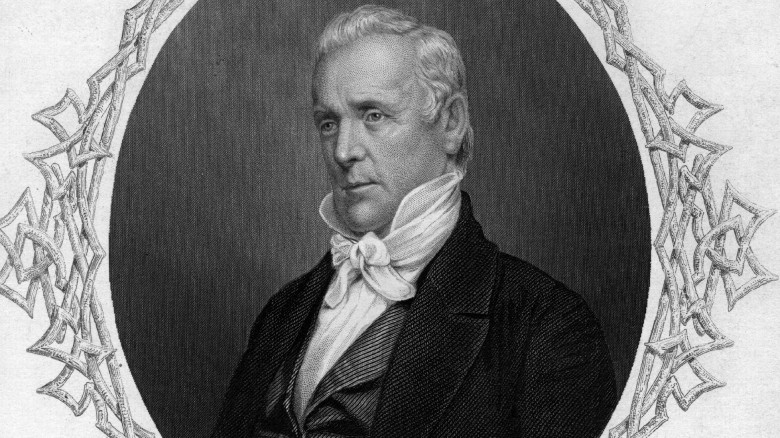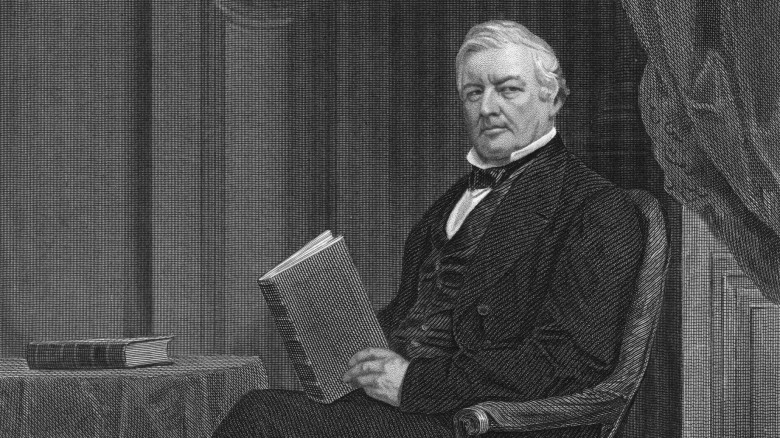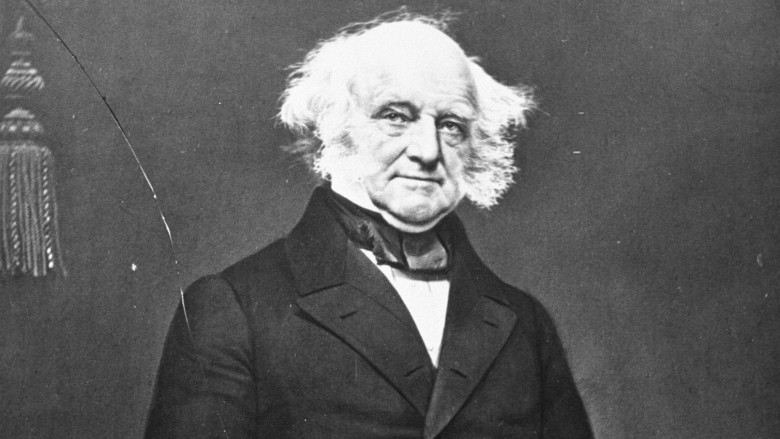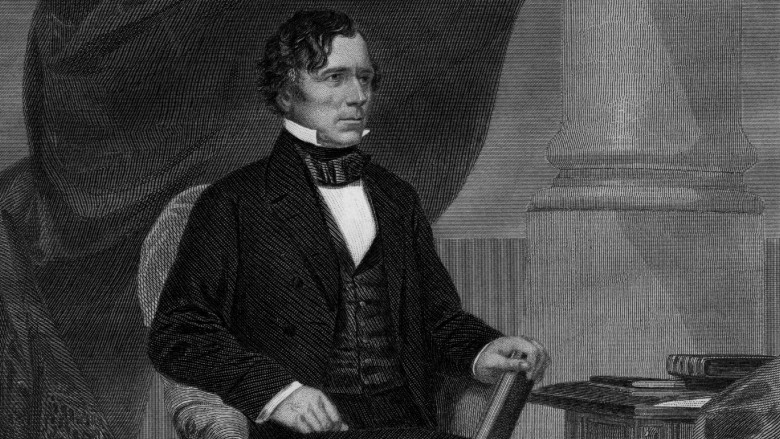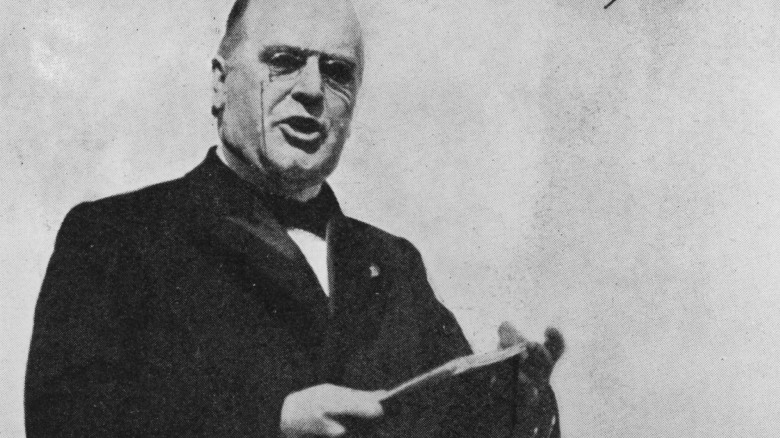Worst Presidents In American History
You can guarantee that if you become President of the United States of America, about half the country will doubt every move you make. If you think this is something new, you'll be surprised to learn that since George Washington left office, there have been outcries of "Worst President Ever!" Some of these guys below might not be household names, but they were all bad in their own, special way.
James Buchanan
James Buchanan, 15th President, recalled as the only bachelor President, the guy before Abraham Lincoln, or, the exact reason the United States fell apart. When South Carolina seceded from the Union, it was on Buchanan's watch. And he did nothing. He didn't think he could do anything. "It is beyond the power of any president, no matter what may be his own political proclivities, to restore peace and harmony among the states. Wisely limited and restrained as is his power under our Constitution and laws, he alone can accomplish but little for good or for evil on such a momentous question." Um ... sounds like he had the duties of President and Hall Monitor confused.
When the Dred Scott decision came down — concerning slaves residing in free states and suing for freedom — he agreed with the decision. It is important to recall that what Chief Justice Roger Taney said in his majority opinion is that blacks had no right to sue if they were former slaves, and the President of the United States said, "Yep." Buchanan supported states rights, but he did it to the nth degree, with no comprehension as to the storm that was brewing. In his inaugural speech, Buchanan dismissed slavery as "happily, a matter of but little practical importance." Had Buchanan not been such a poor leader, he could have quelled at least some of the insurrection that led to the Civil War.
Millard Fillmore
Millard Fillmore, 13th President, recalled as the last Whig President, had a duck comic strip named for him, and he later ran for President on the "Know Nothing" ticket in 1856. There could not be a more a suitable party for ol' Millie.
Fillmore came to power after the untimely passing of Zachary Taylor. "Old Rough and Ready" was ready, alright: when South Carolina threatened to secede over slavery not entering new American territories, President Taylor promised to personally lead troops against rebelling states. And then he died. Enter Millard Fillmore, who knew nothing of how to deal with the coming insurrection, so he treated it like when you ask a little kid what their favorite ride at Disney World is: "I like alllll the rides."
Fillmore backed the Compromise of 1850, which basically kicked the slavery can down the road for someone else to deal with, and kept the country's laws as-is. It also kept the fugitive slave law intact, which naturally kept the northern and southern states in a proxy war via "slave catchers." Here's the thing: Fillmore was anti-slavery, but he was just too spineless to actually stand up and stop it when he had the chance.
Martin Van Buren
Martin Van Buren, 8th President, recalled as the guy who popularized "OK" and as the only President not related to England's King John. So he's an outsider, different from the seven before him, in more ways than one. Hand-picked by Andrew Jackson, Van Buren thought he'd just come in and continue riding on President Jackson's coattails throughout his term. Nope.
Up until Van Buren, the U.S. Presidents all had decent reputations, for the most part. He was truly the first "Worst President." You know that whole Trail of Tears thing, where Native Americans were forced to walk thousands of miles from their homelands? Van Buren did that. You know how you hate political machines and their unyielding power and destruction? Marty is responsible for that, too.
When you think "professional politician," blame Van Buren. He inherited Andrew Jackson's bank issues, which led to the Panic of 1837, where 39,000 Americans went bankrupt. Van Buren blamed greedy Americans and not the true problem, Jackson's policies, because "Party first!" and Van Buren was a suck-up. Those greedy Americans voted him out of office in 1840.
John Quincy Adams
John Quincy Adams, 6th President, recalled as the son of a President and skinnydipper. JQA gets a lot of love for everything he did that wasn't Presidential. He is considered the greatest Secretary of State ever, he negotiated the Treaty of Ghent that ended the War of 1812, and he represented the rebelling slaves of the Amistad in front of the Supreme Court. But his work as a President ... not so good.
Adams should have never been President in the first place. He finished second in both popular and electoral votes, but first place vote-getter Andrew Jackson lacked the 2/3rd majority to actually win. The election went to the House of Representatives, and thanks to one of the most crooked deals ever concocted, fourth place finisher Henry Clay pledged his votes to Adams, in exchange for the Secretary of State job. Jackson supporters called it "the corrupt bargain."
As a minority President, he served a fractured political party thanks to guys like Martin Van Buren being so rah-rah, and basically got nothing done. He did build a road, and they completed the Erie Canal on his shift, but that's about it. Oh, and he signed the Tariff of Abominations in 1828, which strongly condemned Tim Roth's portrayal of the character in The Incredible Hulk. No, wait — that's not right.
The Tariff of Abominations was actually this little insignificant piece of legislation that put a tax on foreign goods, leading to decreased profits in the North and cost of living increases in the South, which then led directly to John C. Calhoun writing that South Carolina had a right to secede from the Union. So all Adams did was lay the groundwork for the Civil War. No biggie.
Andrew Johnson
Andrew Johnson, 17th President, recalled as the guy after Lincoln, the guy who got impeached ... and the guy who got drunk as a skunk at his Vice Presidential swearing-in. The term accidental president gets thrown around a lot, but when Lincoln missed the end of Our American Cousin the hard way, Johnson became the wrong guy for the job, immediately.
As a War Democrat, he and Lincoln were not in the same political party. Ol' Abe just chose him to shore up some votes from border states, like Johnson's Tennessee, which is why you've never heard of Hannibal Hamlin. Lincoln's vision for healing the nation after the Civil War was compassion, but Johnson wanted blood. The popular notion that Johnson wanted to free the slaves is untrue: he convinced Lincoln to leave slave holding union states out of the Emancipation Proclamation, and, as President, didn't exactly encourage their freedom. He more wanted them as they were before the war.
When you think "Jim Crow" laws, think Andrew Johnson. As President, he forced through laws that would later re-emerge as "Jim Crow" decades later. Congress wasn't in session when Johnson started playing King with all the freedmen, so upon their return, they started overturning his dictates, and then passed a Tenure of Office Act that said he was stuck with the people serving in his cabinet. His impeachment came directly from Secretary of War Edwin Stanton refusing his orders, and Johnson illegally firing him ... because of the Tenure of Office Act. Johnson should have seen that one coming.
Johnson, however, remained President by only one impeachment vote. He was a super-bad President, but he was actually right about one thing. In 1926, the Supreme Court said the Tenure of Office act was actually unconstitutional, vindicating Johnson and highlighting that it was the only thing he really got right in his term.
Woodrow Wilson
Woodrow Wilson, 28th President, recalled as the guy in charge during World War I, the League of Nations dude, and the Prez that had a stroke. For a long time, Wilson got a lot of love as a great President, but recently, the layers of the onion have peeled back to show a guy with a very bigoted spirit. Wilson was, however, the first real academic President, obtaining his Ph.D. from Johns Hopkins and later serving as President of Princeton University. But for a smart guy, he was pretty dumb about a lot of things.
Wilson was a southerner, despite his hoity-toity, northern education roots. And as a southerner, he held very specific opinions on black Americans — he hated them. He wildly praised the blockbuster film The Birth of a Nation, the one that makes the KKK the good guys and freed blacks evil. The film led directly to segregation exploding throughout the country. When Civil Rights leader William Trotter met with Wilson at the White House to discuss it, Wilson threw him out. He removed black workers from federal jobs, and when Southerners protested, he fired them.
But at least they got to stay in the country — Wilson deported anyone he deemed "communist" or against America's involvement in World War I. He also sent U.S. troops to invade Russia, Haiti, and Mexico, and those places had nothing to do with World War I. Why is he beloved again?
Rutherford B. Hayes
Rutherford B. Hayes, 19th President, recalled for not drinking alcohol and ... his wife not drinking alcohol. We're not saying alcohol is the be-all and end-all, but RBH was a sourpuss. If it wasn't for a bargain almost as corrupt as the John Quincy Adams' in 1824, he would not have been President. Hayes sat 20 electoral votes shy of the big seat when Southerners agreed that if the U.S. withdrew troops from the former confederacy, he could have the Presidency and some questionable votes. By "questionable," we mean he stole the freakin' election. Nice way to start your term!
The biggest problem with Hayes isn't how he even got to serve. He also released federal troops in the South a bit too soon and before blacks had fully integrated into society, which had serious ramifications down the road. He came within a few feet of invading Mexico and starting a war over Mexicans crossing into the U.S. and robbing towns. Mexico sent troops as well, and a, um, Mexican standoff occurred. The conflict ended when the U.S. formally recognized Porfirio Diaz as President of Mexico, who also was a dictator. Great.
The Bland-Allison act led to an economic surge in 1878, but Hayes vetoed the bill and Congress had to override his veto to set things straight. Basically, Hayes appeased to get in the office, appeased dictators, and vetoed the only good thing to happen in his four years.
Grover Cleveland
Grover Cleveland, 22nd and 24th President, recalled for serving two non-consecutive terms, being fat, and fathering a illegitimate child. That he served twice, but not in a row, tells you he was a popular guy — he won the popular vote, in fact, three straight years. People liked him. You know what? People liked Yahoo Serious, too.
For a guy who served twice, it's hard to come up with a single thing he came up with, because he notoriously didn't do much. During the Panic of 1893, in his second term, he decided to sit that one out and let the market fix itself. It didn't. He vetoed the daylights out of everything that came across his desk, including a bill to give seeds to a drought-stricken Texas. C'mon, they're just seeds, Grover! He let 'em down easy, saying, "I do not believe that the power and duty of the General Government ought to be extended to the relief of individual suffering." All the tact of a barbershop quintet.
He married a 21-year old while in office, and probably didn't think too much of her, because after he left office, he said on women's suffrage, "Sensible and responsible women do not want to vote." Smooth.
Franklin Pierce
Franklin Pierce, 14th President, recalled for being the first "dark horse" President, and having his son killed right in front of him in a train derailment. That happened right before his inauguration, and cast a shadow over his entire term. But, life-shattering tragedy aside, Pierce was a terrible President.
The New Hampshirite had very southern sympathies, to the point of strongly supporting the expansion of slavery. That whole Bleeding Kansas thing happened on his watch, because of his pro-slavery leanings. He wanted to annex Cuba — even by force — and make it a slave state. He kicked the British Ambassador out of the U.S., citing the Crimean war, but really it was because of British interests in Central America. See, Pierce wanted those areas, too, to make them slave holding states. When American William Walker took over Nicaragua in a coup, Pierce recognized him as the rightful ruler, and hoped to put slaves there. See a trend? He really liked slavery.
His own party thought so little of him he didn't win his party's renomination in 1856. So he did the next most sensible thing, and drank his face off.
William McKinley
William McKinley, 25th President, recalled for being Mark Hanna's puppet and getting assassinated. He wasn't the worst President — not by any stretch — and the U.S. did pretty awesomely, economically, during his time. He was also, of course, sitting behind the wheel when the Spanish-American War saw the U.S. obliterate Spain and all their worldly holdings.
Sure, McKinley liked to look the other way when it came to monopolies. He was totally one of those "orange properties" guys that you hate playing against. But McKinley's big problem is something largely forgotten today: the Philippines. The U.S. obtained the Philippines from Spain in the spoils of war. He agonized over what to do with the Asian property, then it came to him — civilize and Christianize them. What could go wrong?
Well, the Filipinos weren't in on the plan. When the U.S. tried to forcibly "Americanize" them, a war broke out. And this wasn't a tiny little war: it lasted three years and led to 4200 American deaths and over 20,000 Filipino casualties. Over 200,000 Filipino civilians also died during the actions. All the horror stories you hear about the Vietnam war happened first in the Philippines: burning villages, torture, and even "re-education camps" to "Westernize" the Filipinos. All that came after McKinley supposedly prayed on what to do, and that was the answer he got. Maybe get a second opinion next time?

